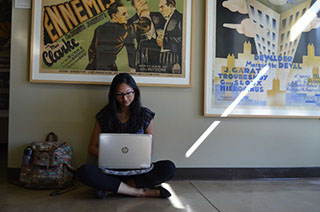In the wake of the Muslim travel ban, anti-Sharia protests and President Trump’s Islamophobic rhetoric, the Muslim population has been increasingly isolated and pressured to assimilate to Western ideals.
“I don’t think I felt afraid to be Muslim until President Trump,” Aisha Razzaq, a Communicative Disorders major, said. “I shouldn’t have to be afraid.”
Razzaq, a Muslim-American, is the secretary on the board for the Muslim Student Association (MSA) on campus. “MSA’s goal is to project that Muslims are here, and we’re just like everybody else,” Razzaq said. “We just want to be accepted, we want to be understood.”
As a college student Razzaq finds it difficult to hold on to her faith, “I don’t think Muslims have to assimilate but depending on your age and your ideals – you will unconsciously assimilate,” Razzaq said.
Coming from an interfaith household Razzaq was exposed to tolerance at a young age, “My dad is Muslim and my mom is Catholic. We had the choice of what we wanted to practice,” Razzaq said. “Growing up in that accepting environment and growing up in America has been very conflicting,” she said.
One week after being inaugurated, President Trump issued an executive order banning entry for 90 days for citizens from predominantly Muslim countries and indefinitely banned Syrian refugees. The latest iteration of the ban introduced three new countries to the list – Venezuela, North Korea and Chad.
“I think it’s a punitive measure. It’s absolutely illogical given the new nations that have been added to the list. What did Chad do?” Dr. Khanum Shaikh, a professor in the Gender and Women’s Studies department, said.
The newest version of the ban indefinitely blocks citizens from these countries from entering the U.S. in an effort to curb terrorism. “This is not about religion — this is about keeping our country safe,” the President wrote in a statement.
“Refugees are the most marginalized and decimated population who have suffered mostly from terrorism and the U.S. war on terrorism,” Dr. Shaikh said. “To punish them in the guise of proper vetting is bogus.”
Imran Bholat, the president of MSA, doesn’t believe that the travel ban represents American ideals, “Our founding fathers, to some extent, were refugees who came here for a better life. These weren’t the ideals set by them,” Bholat said.
In the wake of the Muslim travel ban, communities outside the faith have spoken out against its racist underpinnings, “I have been deeply moved by the amount of resistance towards the ban by communities outside the faith,” Dr. Shaikh said. “In an act of solidarity there was a mass prayer on Vermont Avenue with people from all faiths and racial backgrounds coming together in support of Muslims.”
Anti-Sharia protests have been gaining more momentum since the travel ban’s inception. Protesters argue that Sharia will be brought to the U.S., overturning the current system of laws.
According to Snopes.com, Sharia law is a set of guidelines based on scriptures in the Muslim faith subject to interpretation and debate amongst the community.
Bholat doesn’t put much weight on Sharia within his own practice, “Muslims debate on Sharia and there isn’t a concrete set of laws that we are trying to enforce on the government,” Bholat said.
Anti-Sharia protesters have spoken out against the laws because of the fear that it will spread to the U.S., “Non-Muslims have a tendency to identify Sharia law with harsh corporal punishments…while the elements of Sharia covering everyday life are not that different from the Western legal tradition,” Snopes reports.
As a Muslim feminist, Dr. Shaikh holds many criticisms of Sharia in regards to its treatment of women, “This fear of Sharia is ridiculous because nobody is trying to overturn U.S. law.,” Dr. Shaikh said. “There are many unjust things in Sharia but one can say the criminal justice system in the U.S. is overtly racist and deeply unjust.”
Terrorist groups that have claimed the Muslim faith have created a fear of the religion while members of the community fight to denounce these extremists.
“We, as individuals, know that these terrorists don’t represent Islam but media outlets try to show that they do,” Bholat said. “Islam is a religion of peace; for you to feel fear without legitimate reasons, is wrong.”
In an effort to debunk myths about the religion and educate students on campus, MSA hands out free literature about Islam every Monday from 11 a.m. to 2.pm. In front of the Matador statue.
“At the end of the day we’re CSUN students who face the same struggles as you. Relationship drama, 3 a.m. study sessions, crappy professors, and bad parking at times,” Bholat said.
MSA is an organization on campus that is inclusive of all faiths and backgrounds, “Take that chance, come by our meetings. I can’t express how much we’d love to have you,” Bholat said.
To get involved with the Muslim community on campus, MSA meetings are held every Thursday at the ECC from 5-7 p.m. and the Women’s Research and Resource center hosts a Muslim women’s collective Friday’s from 2-3 p.m.






